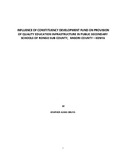| dc.contributor.author | Obuya, Jenipher A | |
| dc.date.accessioned | 2014-10-28T06:20:55Z | |
| dc.date.available | 2014-10-28T06:20:55Z | |
| dc.date.issued | 2014 | |
| dc.identifier.citation | Master Of Arts Degree In Project Planning And Management, University Of Nairobi, 2014 | en_US |
| dc.identifier.uri | http://hdl.handle.net/11295/74568 | |
| dc.description.abstract | The government has identified centralized planning as a serious development bottleneck and devised strategies for gradual devolution of decision‐making power to the local level. Among other development blueprints is the Constituency Development Fund (CDF), which aims at decentralizing development planning to enable grassroots communities maximize their welfare in line with their needs. The purpose of this study was to establish the influence of constituency development fund on the provision of quality educational infrastructure in public secondary schools in Rongo District under the following objectives; to determine the extent to which constituency development fund influence the provision of quality curriculum infrastructure, to assess the extent to which constituency development fund influence the provision of quality curriculum support infrastructure, to examine the extent to which constituency development fund influence the provision of quality school sanitation facilities and to establish the influence of constituency development fund in the provision of quality co‐curricular infrastructure in public secondary schools of Rongo District. The study adopted descriptive survey design as a blue print to guide the study. The sample size of the study was 129 respondents comprising of: 19 principals, 95 Heads of Departments and 15 CDF committee officials. Purposive sampling technique was applied in identifying the appropriate respondents used in the study. A structured questionnaire was used to collect data from the sampled respondents. Qualitative data was collected using an interview schedule directed to CDF committee officials. Quantitative data collected from the closed‐ended sections of the structured questionnaire was analyzed using descriptive statistics in the form of frequencies and percentage tables with the aid of SPSS (Statistical Packages for Social Scientists). Qualitative data collected from the open ended sections of the structured questionnaire was organized into themes guided by the objectives of the study/ research questions and reported narratively. Findings of the study revealed that: 10(66.7%) of principals and 63(70%) of HODs acknowledged that CDF funded teaching and learning infrastructures in their schools. Majority of principals 8(53%) and 54(60%) of HODs consented that CDF funded curriculum support infrastructures in schools. However, 7(46.7%) of principals and 41(45.6%) of HODs were discontented with the quality of school kitchen sponsored by CDF. 12(80%) of principals and 57(63.3%) of HODs confirmed that CDF did not participate in the construction of quality toiletry facilities in schools. Majority of principals 9(60%) and HODs 47(522%) confessed that CDF did not participate in the provision of co‐curricular infrastructures in most public secondary schools of Rongo District. Majority of principals 8(53.3%) and HODs 55(61.1%) rated the quality of co‐curricular infrastructures provided by CDF as fair. Based on findings of the study, the study made the following recommendations: CDF officials should increase the allocation of funds meant to facilitate the construction of curriculum infrastructures in schools in order to hasten and improve the completion of initiated projects; regular inspection XVII
should be initiated and sustained by CDF committee officials to check on the quality of projects sponsored by CDF in schools; more toiletry facilities should be built in schools to off‐load the pressure exerted by students on the already existing toiletry facilities using CDF funds; CDF officials to allocate more funds to facilitate the construction of quality co‐curricular infrastructure | en_US |
| dc.language.iso | en | en_US |
| dc.publisher | University of Nairobi | en_US |
| dc.title | Influence of constituency development fund on provision of quality education infrastructure in public secondary schools of Rongo sub county, Migori county – Kenya | en_US |
| dc.type | Thesis | en_US |
| dc.type.material | en_US | en_US |

